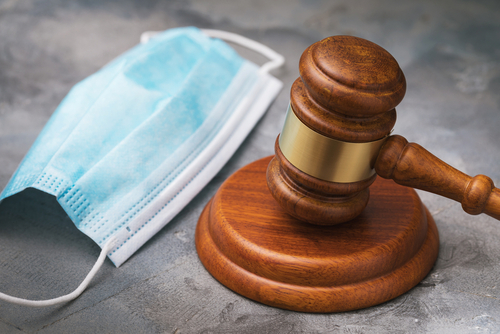Face masks at trial didn't violate confrontation right of officer accused of bathroom assault, 4th Circuit rules

The Sixth Amendment right to confrontation wasn’t violated when a judge required witnesses to wear face masks in the trial of a former West Virginia police officer accused of violating the civil rights of a public intoxication arrestee. Image from Shutterstock.
The Sixth Amendment right to confrontation wasn’t violated when a judge required witnesses to wear face masks in the trial of a former Logan, West Virginia, police officer accused of violating the civil rights of a public intoxication arrestee, a federal appeals court has ruled.
The 4th U.S. Circuit Court of Appeals at Richmond, Virginia, ruled against the officer, Everett Lee Maynard, in a Jan. 11 opinion.
Maynard was accused of escorting the arrestee to the bathroom, where a “series of loud noises” happened before Maynard dragged the man out of the bathroom, slammed the man’s head into a door frame while carrying him into another room, and then dropped him on the ground.
The man lay motionless for several minutes, while blood formed around his head, according to the 4th Circuit opinion. Maynard told another officer to call an ambulance and stated: “I went too f- - -ing far.” The man had a broken nose, was referred to a maxillofacial surgeon, and received seven staples to close his head wound.
The man had made several requests to go to the bathroom that Maynard and his partner at first ignored. Before entering the bathroom with the man, Maynard put on a pair of black gloves, told the other officer: “Tonight’s the night,” and raised his middle finger to the security camera, the appeals court said.
Inside the bathroom, Maynard could be heard yelling, “Remember I said you don’t make demands of me?”
Maynard had claimed that the arrestee grabbed for his gun in the bathroom, and when he knocked the arrestee into a doorframe, it was accidental.
Maynard was convicted in November 2021 for violating the arrestee’s civil rights by using excessive force against him.
A federal trial judge had ordered all trial participants, including witnesses, to wear face masks because of the COVID-19 pandemic. Maynard had objected and asked instead that the court allow clear face shields to be used. The request was denied.
The appeals court upheld the trial judge’s decision, citing Maryland v. Craig, a 1990 U.S. Supreme Court case. That decision said the right to confrontation is satisfied absent a face-to-face confrontation when two conditions are met. The first is that the denial of such a confrontation must be necessary to further an important public policy. The second is that the reliability of the testimony is “otherwise assured.”
The 4th Circuit found no confrontation clause violation under the Maryland v. Craig standard.
“Protection against the spread of COVID-19 is no doubt an ‘important public policy’ interest,” the appeals court said. “By the time of Maynard’s trial in November 2021, more than 700,000 people in the United States had died from COVID-19. … In West Virginia alone, nearly 5,000 people had died.”
In addition, reliability was assured because the witnesses testified in person and under oath, they were cross-examined, and their demeanor could be observed by jurors, the 4th Circuit said.
“Maynard protests that the masks hindered the jury’s ability to assess the witnesses’ credibility. But jurors assess credibility not only by facial expressions but also by ‘the words the witnesses said … how they said them … their body language, their pauses, their mannerisms and all the other intangible factors that are present in a trial,’” the 4th Circuit said, citing a 2021 4th Circuit case.
“So we can’t say that a mask covering only a witness’s nose and mouth violates the confrontation clause,” the appeals court wrote.
Chief Judge Albert Diaz, an appointee of former President Barack Obama, wrote the opinion in United States v. Maynard. He was joined by Judge J. Harvie Wilkinson III, an appointee of former President Ronald Reagan, and U.S. District Judge Robert S. Ballou of the Western District of Virginia, who was sitting by designation.
Hat tip to Law360 and How Appealing.



